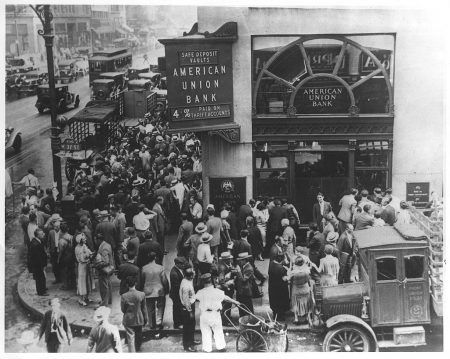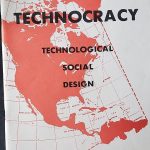
Bank Run on American Union Bank, 1925 - Public domain
Originally written: 7/14/2011
There is much I don’t understand about the world’s economic crisis but what I do get is that everyone owes everyone else and no one has the money to pay it back. That is of course an overstatement, but when you look at it, it does seem that a lot of people are broke — the governments of the world are broke, large swaths of their citizens are broke, non-profits are struggling, and many businesses are hanging by a thread.
Universally, it seems, we are simply out of money. We owe more than we make and we can’t pay our bills. Or at least, not all of them.
The solution to this problem, if the United States Government is any example, is to borrow more money. That’s easy for them to say — they’re the United States Government. Oddly enough, their bond-rating is better if they raise the debt limit and borrow more than if they don’t. I guess being in debt up to your ears to the Chinese is a good thing.
I realize that everything the world over is connected and that if a check bounces in Cinncinnati, it can take out a whole franchise in Taiwan. Or maybe it isn’t that delicate or complicated. Consider this: debt default or no debt default, there will still be 300 million living people in this country, who will still want to get up, breath, eat, work, laugh, and sleep through the night, whether the U.S. raises the debt limit or not.
Which brings me to the solution: universal debt amnesty. What if on the 2nd of August, instead of borrowing a whole lot more money, we just foregave all past and current debt. Foreclosed people could stay in their houses. Towns with expensive wastewater treatment plants could stop charging surcharges on every resident with a bathroom. People who get strange calls from unknown collection agencies could answer their phones once more. And best of all, governments could stop worrying about debt repayment on silly debts that they shouldn’t have taken on in the first place and concentrate on bringing their citizens through the real crises that loom before us.
Like it or not, our way of life as 21st century human beings is threatened. For one thing, we are indeed running out of fossil fuel. If anyone doubts that, learn a little more about fracking — the incredibly destructive technique of extracting oil shale from under the earth — and ask yourself, why would they want to do all that for a 2 year supply of oil?
The climate is changing. Erratic weather has become normal. Terrible forest fires in the southwest, drought in the south, unusually violent storms, 100 year floods, and all the rest are part of the new reality.
People themselves are not holding up as well as we once expected. Modern man is prone to a host of new diseases and suffering a rise in many of the old ones. We are not healthy or happy. And to make matters worse, we can’t even afford what healthcare there is for the ills that plague us.
But instead we’re worrying about a debt crisis — a giant debt-ball of paper obligations so complex that no one could unravel it in a million years. Instead, the plan appears to be the opposite. Rather than try to untie all those knots, they’re going to make more.
Capitalism is a funny system. It can work for a long long time and seem so solid, you can’t imagine it could ever change. But capitalism is based on the maxim “Grow or die.” It’s about maximizing shareholder profit and very little else. Consequently, the system has to be regulated or like the balloon that’s been overfilled with air, it self-destrusts. As we are seeing now.
There are bigger problems than money, hard as that is to believe. But if we allow the issues of who owes who to consume us, we won’t have anything left, creatively or economically, to deal with the real problems of next generation energy sources, climate change, poverty, and a host of other problems that are coming home to roost even now.
So crazy as it sounds, now really is the time to solve the debt crisis — by absolving all existing debt and then creating a new system that allows people to enjoy what lives they have without having to slave those lives away in the service of money owed long ago to people long forgotten.
Capitalism has served its purpose but it’s no longer serving us today. Instead, it’s holding us back as we struggle with the impacts of massive profits, suffocating debt, unnatural globalization, and unsustainable economies. Capitalism made these problems but it’s very unlikely that it can solve them. Perhaps it should step out of the way. Or perhaps its pernicious influence can be swept away and a new day declared, one in which the name of the game is not based on promissory notes and endless loans.




